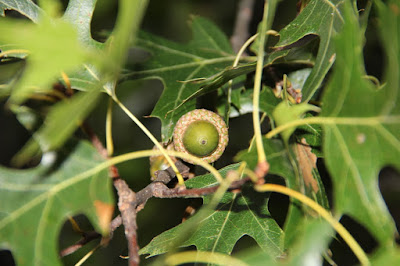 |
| milkweed seed pods not looking like milkweed flowers
Photo by J. Harrington
|
Similar issues seem to arise even at the level of language, culture and worldview as we communicate our perceptions to you, we wonder if you are hearing what we are saying; reading what we are writing; understanding what we are espousing? The more we contemplate these questions, the easier it seems to actually step into the same river twice. (Are you the same you? Is the river the same water? Is time the same time?)
 |
| a green acorn not looking at all like an oak tree
Photo by J. Harrington
|
If it hasn't yet become clear, we're continuing to read The Hidden Life of Trees. It contains information and perspectives that fit nicely with the following Shakespeare's lines:
There are more things in heaven and earth, Horatio,Never, except in fairy tales, did we contemplate trees communicating, nor cooperating. The more we read descriptions such as Hidden Life, the more we become aware of how much we don't know. Long ago, before we became a recovering planner, we were at one time mightily influenced by Daniel Burnham's dictum:
Than are dreamt of in your philosophy.
"Make no little plans. They have no magic to stir men's blood and probably will not themselves be realized."Fortunately, once upon a time, after we had begun to notice some of the limitations of Burnham's advice, we came across Donella Meadows' Dancing with Systems. We plead guilty to being well-described in the opening paragraphs:
People who are raised in the industrial world and who get enthused about systems thinking are likely to make a terrible mistake. They are likely to assume that here, in systems analysis, in interconnection and complication, in the power of the computer, here at last, is the key to prediction and control. This mistake is likely because the mindset of the industrial world assumes that there is a key to prediction and control.
...
“For those who stake their identity on the role of omniscient conqueror, the uncertainty exposed by systems thinking is hard to take. If you can’t understand, predict, and control, what is there to do?
...
“We can’t control systems or figure them out. But we can dance with them!”
We must try harder to remember Meadows' guidance, all of it, as we ponder the predicament(s) we humans seem to have gotten ourselves and our forests and trees and air and seas into and how to use the 14 points of systems wisdom to either evaluate or help create responses to our problems. Most especially, we have been guilty of failing to pay nearly enough attention to Meadows' final point:
14. HOLD FAST TO THE GOAL OF GOODNESS.
The Thanksgivings
Translated from a traditional Iroquois prayer
We who are here present thank the Great Spirit that we are here to praise Him. We thank Him that He has created men and women, and ordered that these beings shall always be living to multiply the earth. We thank Him for making the earth and giving these beings its products to live on. We thank Him for the water that comes out of the earth and runs for our lands. We thank Him for all the animals on the earth. We thank Him for certain timbers that grow and have fluids coming from them for us all. We thank Him for the branches of the trees that grow shadows for our shelter. We thank Him for the beings that come from the west, the thunder and lightning that water the earth. We thank Him for the light which we call our oldest brother, the sun that works for our good. We thank Him for all the fruits that grow on the trees and vines. We thank Him for his goodness in making the forests, and thank all its trees. We thank Him for the darkness that gives us rest, and for the kind Being of the darkness that gives us light, the moon. We thank Him for the bright spots in the skies that give us signs, the stars. We give Him thanks for our supporters, who had charge of our harvests. We give thanks that the voice of the Great Spirit can still be heard through the words of Ga-ne-o-di-o. We thank the Great Spirit that we have the privilege of this pleasant occasion. We give thanks for the persons who can sing the Great Spirit’s music, and hope they will be privileged to continue in his faith. We thank the Great Spirit for all the persons who perform the ceremonies on this occasion.
********************************************
Thanks for visiting. Come again when you can.
Please be kind to each other while you can.
No comments:
Post a Comment